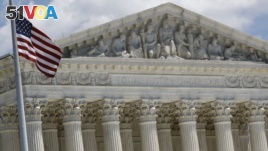04 July 2020
In its first big abortion ruling since President Donald Trump took office, the U.S. Supreme Court blocked a Louisiana law that would likely have closed all but one abortion center in that state.
In the ruling, which took place Monday, five justices voted to block the law. Four voted against blocking it.
Supporters of abortion rights are pleased, and maybe a bit surprised. People who oppose abortion are unnerved and angry.

In this June 29, 2020, photo, the Supreme Court on Capitol Hill in Washington. (AP Photo/Patrick Semansky)
But, people on both sides agree on one thing: The upcoming election is critical to their cause.
The Supreme Court's ruling is seen as an important test of the court's position, following Trump's appointments of two conservative justices: Neil Gorsuch and Brett Kavanaugh.
Both Gorsuch and Kavanaugh supported the Louisiana law. But they were outnumbered, as Chief Justice John Roberts sided with the court's four more liberal justices.
The ruling was another major decision in which the conservative-leaning court failed to give a victory to conservatives during an election year. One recent ruling protects members of the LGBT community from discrimination at work. Another rejected Trump's effort to end protections for young immigrants.
Anti-abortion leaders say there is an urgent need to reelect Trump so that he can appoint more conservative justices to the court. Abortion rights activists say it is extremely important to defeat Trump and end Republican control of the Senate. Republican lawmakers in the Senate have been able to confirm many conservative judges during Trump's time in office.
Heidi Sieck is the co-founder of #VOTEPROCHOICE, a rights group online. She told the Associated Press (AP) that the Louisiana law was a clear "challenge to our reproductive freedom. And it points to the urgent need to vote for pro-choice candidates from the top of the ballot all the way down."
James Bopp Junior is with the group National Right to Life. He made a similar point, but from the opposite position.
He told the AP, "The decision demonstrates how difficult it is to drain the (D.C.) swamp and how important it is that President Trump gets reelected so that he may be able to appoint more pro-life justices."
Religious leader Frank Pavone is national director of the pro-life group Priests for Life. He is also a member of the Trump campaign's Catholic voter outreach project. He noted that two of the liberal justices — Ruth Bader Ginsberg and Stephen Breyer — are the oldest members of the court.
"Nobody can predict the future, but who's going to name their replacements when the time comes?" Pavone said. He added that this is a question that moves a lot of people to vote.
Anti-abortion activists have made clear that Monday's ruling would not stop them from pushing for abortion restrictions through state governments.
In recent years, several states have put in place near-total bans on abortion. Courts have later blocked such bans. However, the group Texas Right to Life urged lawmakers in their state to go forward with a measure that would start with a ban on late-term abortions and continue to a total ban.
Mike Gonidakis is president of Ohio Right to Life. He warned against moving too quickly toward widespread bans. He noted that the courts blocked a measure last year that would ban most abortions as early as six weeks into pregnancy.
Abortion rights advocate Nancy Northup, leader of the Center for Reproductive Rights, said Monday's ruling would not stop those trying to ban abortion. But she said her group would continue to fight state by state, law by law, to "protect our constitutional right to abortion."
Northup urged Congress to pass a bill called The Women's Health Protection Act. The measure seeks to strengthen women's ability to access abortions, even in states that pass laws seeking to restrict access. The measure was introduced in May 2019 and has strong Democratic support — but no chance of passage for now because of Republican opposition.
From the other side of the debate, there also are dreams of a congressional solution.
Michael New is an abortion opponent who teaches social research at Catholic University of America in Washington, D.C. He said some anti-abortion legal experts believe Congress could find ways to restrict or ban abortion without the courts. For example, they could establish constitutional legal protections for unborn children.
But any such measures would not succeed for now since Democrats in Congress would wholly oppose them.
I'm Alice Bryant.
The Associated Press reported this story. Alice Bryant adapted it for Learning English. Ashley Thompson was the editor.
_______________________________________________________________
Words in This Story
abortion - n. a medical procedure used to end a pregnancy and cause the death of the fetus
LGBT - adj. lesbian, gay, bisexual and transgender
challenge - n. an action or statement that is against something
drain the swamp - expression. to remove corruption or government waste
Catholic - adj. of or relating to the Roman Catholic Church
access - n. a way of being able to use or get something